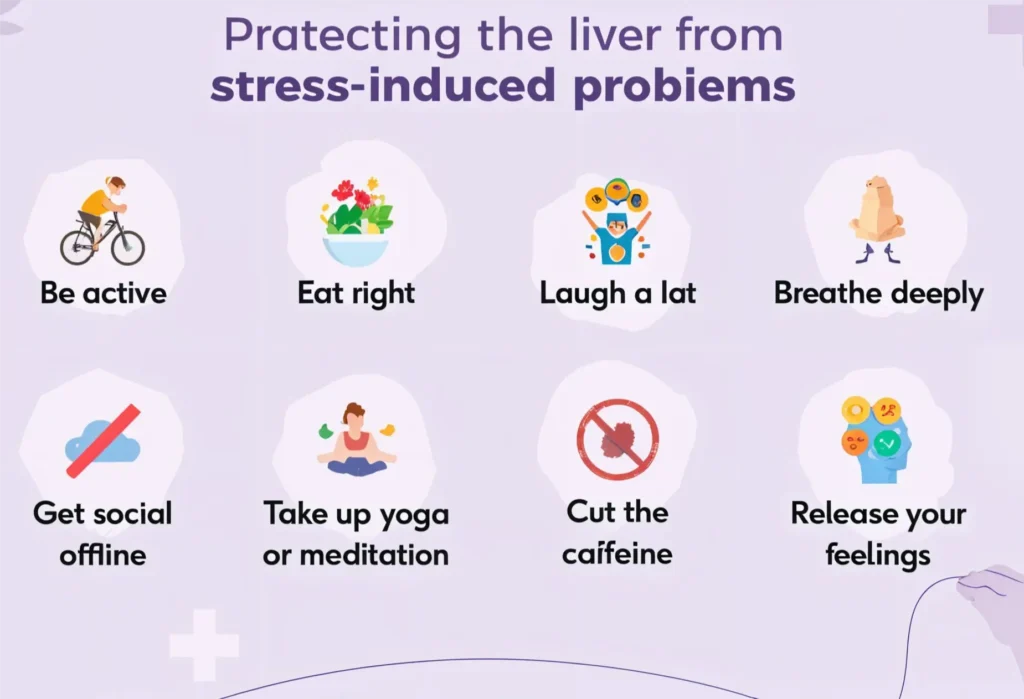Stress—something we all experience from time to time—can impact various parts of our bodies, but can stress affect the liver? Absolutely. The liver plays a vital role in maintaining overall health, and it’s responsible for filtering toxins, metabolizing nutrients, and supporting digestion. However, when you’re under constant stress, your liver may bear the brunt of it, leading to various health issues.
Chronic stress triggers the release of stress hormones like cortisol and adrenaline, which can cause inflammation and disrupt the balance of chemicals in your body. Over time, this can take a toll on your liver’s ability to function properly. In this blog post, we’ll explore how stress impacts the liver, the symptoms you should be aware of, and steps you can take to manage stress for better liver health.
What Exactly is Stress?
Before we dive into can stress affect the liver, let’s first understand what stress is. Stress is your body’s way of responding to any demand or threat. When faced with stressors—be it emotional, physical, or psychological—your body reacts by releasing hormones that prepare you for a “fight or flight” response.
While short-term stress can be beneficial (like meeting a work deadline or escaping danger), chronic stress can harm your body, especially if left unchecked. Prolonged stress causes wear and tear on your organs, particularly the liver, which is tasked with processing the by-products of stress.
How can Stress Affect the Liver?
So, how does stress affect the liver? Yes, stress can harm your liver in various ways. When you’re stressed, your body releases excess cortisol, which can lead to inflammation and fat buildup in the liver. Over time, chronic stress can lead to liver conditions such as:
- Fatty Liver Disease: Stress has been linked to non-alcoholic fatty liver disease (NAFLD). This condition occurs when excess fat accumulates in the liver, making it difficult for the organ to function properly.
- Liver Inflammation: Stress promotes the release of pro-inflammatory cytokines, chemicals that increase inflammation in the liver, potentially leading to liver damage.
- Impaired Liver Function: Chronic stress can affect your liver’s ability to detoxify harmful substances, putting you at risk for toxin buildup and liver dysfunction.
In extreme cases, unchecked stress can even increase the risk of liver diseases. Can stress cause liver disease? While stress alone may not directly cause liver disease, it can exacerbate existing liver conditions or contribute to poor lifestyle choices (e.g., unhealthy eating, alcohol consumption that harm the liver).
Signs and Symptoms of Stress
Stress doesn’t just affect your mind—it manifests physically, too. Here are some common symptoms of stress that can also impact your liver:
- Fatigue: Feeling constantly tired, even after sleeping.
- Anxiety: Feeling nervous or on edge.
- Digestive issues: Stress can cause indigestion or worsen conditions like IBS.
- Sleep disturbances: Difficulty falling asleep or staying asleep.
- Jaundice: Yellowing of the skin or eyes.
- Abdominal pain: Discomfort or pain in the upper right side of your abdomen.
- Chronic fatigue: Constantly feeling drained.
- Dark urine: Urine that is dark in color may indicate liver issues
If you experience any of these symptoms, it’s important to consult a healthcare provider. They may recommend liver function tests to check for liver damage. Can stress affect liver function tests? Yes, elevated stress levels can impact liver enzymes and show up in your test results. Chronic stress can also lead to liver-related symptoms, so it’s essential to recognize and manage stress before it spirals out of control.

Diagnostic Tests for Elevated Liver Enzymes
Stress may not seem connected to liver health, but it can quietly disrupt liver function. Chronic emotional or physical stress triggers inflammation and hormonal shifts, which can elevate liver enzymes even without liver disease. Many young professionals notice unexplained fatigue, poor digestion, or skin issues—subtle signs of liver stress.
To detect such disruptions, common diagnostic tests include:
- Liver Function Test (LFT): Measures liver enzymes like ALT and AST. Elevated levels can signal inflammation, often stress-related.
- Bilirubin Test: High bilirubin suggests inefficient detox, possibly linked to chronic stress.
- Ultrasound: Detects fatty liver or inflammation not visible in blood work.
- GGT Test: Sensitive to alcohol, poor diet, and cortisol-driven stress.
- Fibroscan: Checks liver stiffness, useful if stress has led to long-term metabolic issues.
When liver detox is working, look for:
- Better digestion and bowel regularity
- Clearer skin and reduced bloating
- Improved mood and sleep
- Stable energy and fewer cravings
How can you Know if you’re Stressed?
Identifying stress is the first step in managing it. But how does stress affect the liver? Here are some common signs:
- Emotional signs: Anxiety, irritability, feeling overwhelmed
- Physical signs: Headaches, muscle tension, fatigue
- Behavioral signs: Changes in appetite, trouble sleeping, increased use of alcohol or drugs
By recognizing these signs early, you can take steps to manage your stress before it can stress affect your liver health.
Link Between Stress and Liver Health
There is a direct connection between stress and liver health. Can stress cause liver disease? While it may not be the sole cause, chronic stress certainly contributes to liver issues. Stress-induced hormonal changes, inflammation, and poor lifestyle choices can lead to liver dysfunction over time.
The liver is responsible for breaking down substances like alcohol, medications, and environmental toxins. When your liver is under stress, it struggles to perform these vital tasks efficiently, leading to potential health problems. Can stress cause fatty liver? Yes, prolonged stress can lead to fat buildup in the liver, particularly when it results in poor diet choices.
These signs of liver detoxification help track internal balance. If they’re missing, stress may still be affecting your system.
How to Manage Stress for Better Liver Health
Managing stress is essential not only for your mental well-being but also for your liver health. Here are some practical strategies to help reduce stress and protect your liver:
Meditation
Meditation is a simple yet effective way can stress affect the liver. Taking just 10 minutes a day to focus on your breathing and clear your mind can help lower cortisol levels and reduce inflammation in the liver.
Exercise
Regular physical activity is one of the best can stress affect the liver relievers. Exercise increases endorphins, which act as natural mood lifters. It also helps reduce fat in the liver, lowering your risk of fatty liver disease.
Deep Breathing
Deep-breathing exercises can instantly calm your mind and body, reducing stress hormone levels. Try practicing deep breathing for a few minutes each day to keep stress in check.
Foods to Avoid
Some foods can aggravate stress and harm your liver. Here are some foods to avoid:
- Processed foods: High in sugar and unhealthy fats, they can overload the liver.
- Alcohol: Puts extra strain on the liver, especially when you’re stressed.
- Caffeine: While it may give you a short-term boost, too much caffeine can worsen anxiety and stress.
Foods to Eat
On the other hand, some foods can help you manage stress and support liver health. These include:
- Leafy greens: Rich in antioxidants that help the liver detoxify.
- Omega-3 rich foods: Salmon and flaxseeds can reduce inflammation in the liver.
- Fruits: Berries and citrus fruits contain vitamins that support liver function.
Sleep
Sleep is crucial for stress management and liver health. Poor sleep can increase cortisol levels, leading to liver inflammation. Aim for 7-9 hours of restful sleep each night to allow your liver to regenerate and can stress affect liver function tests properly.
Self-Medicating
One dangerous coping mechanism for stress is self-medicating. People often turn to alcohol, tobacco, or over-the-counter drugs to relax or sleep better. However, these substances can be toxic to the liver when used excessively or without medical supervision.
- Alcohol consumption is a major contributor to liver disease and becomes more dangerous when combined with chronic stress.
- Painkillers like acetaminophen are commonly overused during stressful periods, increasing the risk of liver damage.
- Herbal supplements might seem harmless but can also stress the liver if not used appropriately.
So, if you’re wondering, can stress affect the liver, the answer lies not only in biological responses but also in lifestyle choices prompted by stress.
When Should you Seek Assistance?
If you’re experiencing ongoing stress and any of the following symptoms, it’s crucial to consult a healthcare provider:
- Fatigue and brain fog
- Abdominal discomfort, especially in the upper right quadrant
- Yellowing of the skin or eyes (jaundice)
- Unexplained weight loss
- Digestive issues
These could be early signs of liver dysfunction exacerbated by stress. Mental health support is equally important. Chronic stress and anxiety disorders should be addressed not just to improve quality of life, but to protect your vital organs.
Conclusion
Can stress affect the liver? Yes, it can, and the effects of chronic stress should not be ignored. From inflammation can stress cause fatty liver disease, and stress can negatively impact your liver’s health. Fortunately, by practicing stress management techniques like meditation, regular exercise for liver health, and maintaining a healthy diet, you can protect your liver from the harmful effects of stress. Taking care of your mental health is just as important as taking care of your physical health—start reducing stress today for a healthier liver tomorrow.
Read also Can You Live Without Your Liver.



